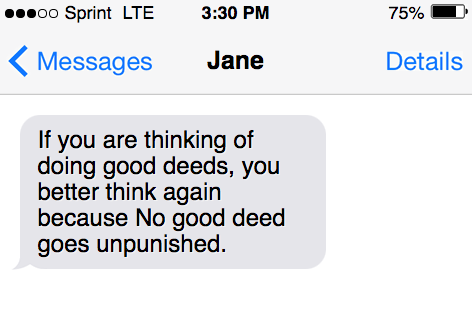What does “no good deed goes unpunished” mean? Why is this a common idiom in American English? And where did it originate?
The phrase ” no good deed will go unpunished ” can be attributed to many personalities and writers. This article will also scrutinize the concept that no good deed will go unpunished and its origin. Also, we will see how to use the phrase no good deed will go unpunished in a sentence.
Learn more in this short idiom guide…
What does “no good deed will go unpunished” mean?
The term “no good deed will go unpunished” implies kind acts may not yield fruitful results, and you might suffer in the end. In layman’s language, you can say that “no good deed will go unpunished” means people who help others will suffer in the end because of their kind behavior.
People who offer help might think he is doing a good deed and will be rewarded for this action. But what about the person getting help do not like to be helped by others? What would you do when the other person getting help does not require your help?
People also believe that “no good deed will go unpunished” because your helpful behavior might tend other people to expect more from you. Or they might ask for further help, which you might not be able to provide.

Where did “no good deed goes unpunished” come from?
The phrase “no good deed will go unpunished” shows no origin. However, it is sometimes attributed to famous writers and poets like Walter Winchell, Oscar Wilde, Clare Boothe Luce, John P. Grier, and Andrew Mellon.
Some people believe that the phrase “no good deed will go unpunished” can be traced back to the fourteenth century and can be founded in the Book of Job.
It was not traditional wisdom since conventional moral and ethical thinkers believe that evil deeds are always punished according to evil frequency. Traditional moral and ethical thinkers also hold that no matter what, the divine judge will always reward good deeds and actions.
This belief that a virtuous act will be rewarded and an evil deed will be punished are similar to the Hindu religious belief of hell and karma. Hindu religion says you will reap what you sow. In other words, you will get what you will give to others.
How “no good deed goes unpunished” is used in poetry?
Many poets, philosophers, and writers used the phrase “no good deed will go unpunished” in various works and used it differently. One of the greatest poets ever, Samuel Taylor Coleridge, used this phrase in his poem “The Rime of the Ancient Mariner.” Where he says, “As the saying goes, no good deed will be unrewarded.” By this, he means that for every action, there will be a consequence equal to or greater than the original action taken.
A philosopher like Thomas Aquinas used the phrase in this famous work, “Summa Theologica.” Where he said that for every wrong act, there would be some punishment, and for every good deed, there would be a reward. By god, the only just judge, no evil action will be forgiven or unpunished.

You can also find the same concept of “no virtuous deed goes unpunished” in a book of Game of Thrones written by George R.R. Martin. Where one character named Ned Stark always followed the righteous path and always took the right action but was finally punished for this.
The phrase “no good deed will go unpunished” can be found in Brendan Gill’s “The Trouble of One House.” Franklin Pierce Adams’s “No Good Deed goes” Unpunished, and many other works of other great poets.
Example of “no good deed goes unpunished” in sentences
- If you are thinking of doing good deeds, you better think again because No good deed goes unpunished.
- Though no good deed goes unpunished, you better focus on the final results.
- As the adage goes, “No good deed goes unpunished,” no matter whether you choose the virtuous path or the evil one, you will be punished or feel regret in the end.
- No good deed goes unpunished, so your end should justify the means.
Who first said the quote, “no good deed will go unpunished?”
The phrase “no good deed will go unpunished” can be traced back to the twelfth century in Walter Map’s work De nugis curialium. A character who believes in inverted morality rewards every false and evil action and punishes every person for following the righteous path.
Does the Bible reference “no good deed goes unpunished?”
In the bible, in Ephesians 4:32, you will find a verse that says you should be kind to everyone, especially to the weak. You should be tenderhearted and forgive everyone no matter how severe their crime was, like Jesus has forgiven you.
However, Jesus performed only good deeds and forgave others for their acts. But it is a bit difficult for us human beings to follow the path of Jesus and forgive everyone for their action.
Sources
- No good deed goes unpunished – Wikipedia
- No Good Deed Goes Unpunished – Grammarist
- As the saying goes no good deed goes unrewarded…. | Bartleby
- Poem: No Good Deed Goes Unpunished
Inside this article
Fact checked:
Content is rigorously reviewed by a team of qualified and experienced fact checkers. Fact checkers review articles for factual accuracy, relevance, and timeliness. Learn more.
Core lessons
Glossary
- Abstract Noun
- Accusative Case
- Anecdote
- Antonym
- Active Sentence
- Adverb
- Adjective
- Allegory
- Alliteration
- Adjective Clause
- Adjective Phrase
- Ampersand
- Anastrophe
- Adverbial Clause
- Appositive Phrase
- Clause
- Compound Adjective
- Complex Sentence
- Compound Words
- Compound Predicate
- Common Noun
- Comparative Adjective
- Comparative and Superlative
- Compound Noun
- Compound Subject
- Compound Sentence
- Copular Verb
- Collective Noun
- Colloquialism
- Conciseness
- Consonance
- Conditional
- Concrete Noun
- Conjunction
- Conjugation
- Conditional Sentence
- Comma Splice
- Correlative Conjunction
- Coordinating Conjunction
- Coordinate Adjective
- Cumulative Adjective
- Dative Case
- Determiner
- Declarative Sentence
- Declarative Statement
- Direct Object Pronoun
- Direct Object
- Diction
- Diphthong
- Dangling Modifier
- Demonstrative Pronoun
- Demonstrative Adjective
- Direct Characterization
- Definite Article
- Doublespeak
- False Dilemma Fallacy
- Future Perfect Progressive
- Future Simple
- Future Perfect Continuous
- Future Perfect
- First Conditional
- Irregular Adjective
- Irregular Verb
- Imperative Sentence
- Indefinite Article
- Intransitive Verb
- Introductory Phrase
- Indefinite Pronoun
- Indirect Characterization
- Interrogative Sentence
- Intensive Pronoun
- Inanimate Object
- Indefinite Tense
- Infinitive Phrase
- Interjection
- Intensifier
- Infinitive
- Indicative Mood
- Participle
- Parallelism
- Prepositional Phrase
- Past Simple Tense
- Past Continuous Tense
- Past Perfect Tense
- Past Progressive Tense
- Present Simple Tense
- Present Perfect Tense
- Personal Pronoun
- Personification
- Persuasive Writing
- Parallel Structure
- Phrasal Verb
- Predicate Adjective
- Predicate Nominative
- Phonetic Language
- Plural Noun
- Punctuation
- Punctuation Marks
- Preposition
- Preposition of Place
- Parts of Speech
- Possessive Adjective
- Possessive Determiner
- Possessive Case
- Possessive Noun
- Proper Adjective
- Proper Noun
- Present Participle
- Prefix
- Predicate



